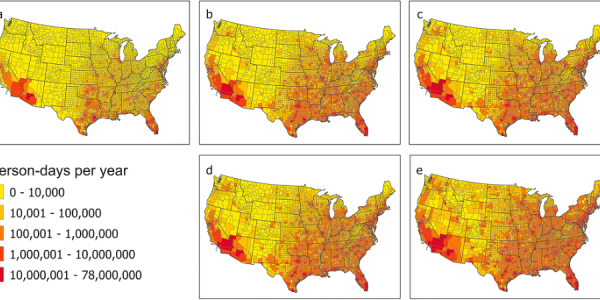Energy Innovation Policy and Technology LLC® has launched a new South Korea EPS model in partnership with the NEXT Group and updated the Mexico and India Energy Policy Simulator (EPS) models. The Mexico EPS was upgraded to the 3.3.1 platform to enable forecasting changes in jobs, gross domestic product, and public health impacts, while India EPS data was updated to account for slower GDP growth resulting from the COVID-19 pandemic.
Blog
Our blogs are accessible under the CC BY license. Users are free to copy, distribute, transform, and build upon the material as long as they credit Energy Innovation Policy and Technology LLC® for the original creation and indicate if changes were made.
Human Health in the Age of Climate Change: Disease, Nutrition, and Access at a Crossroads
Studies show climate events can have catastrophic consequences for human health including the spread of disease vectors and contaminated food or drinking water supplies, but new research is identifying ways to reduce the risks.
Energy Innovation® and Innovative Green Development Program Release Latest China Energy Policy Solutions Model
This week, Energy Innovation Policy and Technology LLC® and the Innovative Green Development Program (iGDP) released a new China Energy Policy Simulator with new features including an updated Business-As-Usual Scenario showing the emissions trajectory under current policies, a new macroeconomic analysis module, and an improved industry module.
“Learning” Frontiers In The Energy Transition
How quickly we reduce harmful greenhouse gas emissions critically depends on how fast we learn in the process. New research uses learning curves to explain staggering declines in costs of key climate technologies like solar photovoltaics and batteries, grounding hopes that we can get where we need to go—as long as we don’t delay getting started.
Extreme Heat Is Deadly, Expensive, Inequitable, And Now, More Than Ever, Preventable
As climate change causes more extreme heat days across the globe, heat has become a critical issue for public health and city planning. Recent research illuminates why extreme heat poses even greater health and economic threats than previously thought, but also points to ways we can build effective solutions to address it.
Why People Oppose Or Support Offshore Wind: Distilling The Key Factors That Drive Social Acceptance Of Ocean Renewable Energy
To scale offshore wind, developers and policymakers need to understand what drives social acceptance and how to integrate community values. New research offers insight into the who and why of renewable energy support and opposition, and what specific actions could support a just transition.
New California Energy Policy Simulator Modeling Shows Major Benefits Of Early Action
This week, Energy Innovation released new research evaluating California’s climate progress and identifying a policy pathway that would reaffirm California as a climate leader. This modeling showed the state is off track for its 2030 and 2045 climate goals and must triple its historic emissions reduction pace. Doing so would generate billions in new GDP and hundreds of thousands of new jobs statewide.
Putting Humans Into Climate Models
This research review explains new studies that demonstrate how incorporating social systems into climate models is important for creating realistic climate forecasts and making informed policy decisions.
The Potential Of Hybrid Clean Energy Systems To Advance Energy And Climate Justice
New research showcases how coupling existing state efforts (1) to accelerate renewable energy adoption in underserved low-income communities and (2) to replace aging gas distribution networks with district heating and cooling could transform overburdened communities into high energy-performance communities that are safer and more resilient.
A Reliable 85 Percent Clean Grid For California Data Explorer
This visual interactive feature allows users to explore the major findings of the technical analysis. Users can interact with graphs showing the build rates for clean energy resources under the three 85 percent clean electricity portfolios, an example of how much of each resource is relied on every month of the year, and how the California grid can meet reliability in the most challenging hour of key tested stress conditions.










